Why is it so hard to hang up the car keys?
The system is set up to regulate drivers who depend on their cars rather than planning for alternatives which work for everyone.
Love it or hate it, driving is an important part of many people’s lives.In a new study, “Who wants to drive forever? Exploring attitudes toward driving and aging” authors Daniel Piatkowski and Wesley Marshall note that 86% of trips in the US are made in private cars, and that most Americans don’t want to even think about giving up the car.
“Because so many Americans rely on their car to meet their basic needs, so many are reticent to stop driving as they get older, or even consider the possibility of ceasing driving as they experience impairments limiting their ability to drive safely, despite the dangers.”
As Matthew Lewis tweets, this is a serious issue in suburbs everywhere. The problem, as we noted earlier in The issue for boomers won't be "aging in place. is that the real question about life after the car is “how do I get out of this place?” The authors of the new study note that “Losing one’s primary means of socializing and accessing vital goods and services can lead to isolation, reduced physical activity, and potentially an overall increased mortality risk. The long-term implications of losing one’s independence can be severe for individuals, their care- givers, and society at large.”
Techno-fixes are proposed, from shared mobility to autonomous cars, most of which focus on the symptoms (needing to drive as one ages) rather than the underlying cause (auto-dependence.) The zinger paragraph:
“ It is a shortsighted conceptualization of the problem which leads to equally shortsighted solutions. It frames driving cessation as an issue of preserving individual mobility rather than a societal priority to ensure accessibility for all. When driving cessation is framed solely around the ability to drive, planners and policymakers lose sight of the underlying issue: if people rarely drive in the first place, then losing the ability to drive is likely a much less isolating experience, regardless of age. Addressing the root causes of driving cessation means confronting auto-dependence in general. Doing so means first taking a holistic approach to the myriad potential factors impacting the need to drive, the desire to drive, and the desire to continue driving for one’s entire life.”
The authors note that of the people they surveyed, “the vast majority of the sample do not take driving cessation seriously. Only 12 respondents stated they disagree or strongly disagree with the statement that they plan to continue driving for their entire life.” But then the respondents all live in Omaha and Lincoln, Nebraska, not exactly hotbeds of dense urbanism and 15-minute cities.
The authors conclude:
“Age-related declines are a normal part of life but are treated by the transportation system as individual failings that require individual solutions. An example of implicit inequities and ableism the transportation system. As such, driving cessation is often considered a regulatory or licensing issue, unworthy of serious attention from planners.”
Instead, we should be targeting neighbourhood accessibility and reducing auto dependence for all. “Enacting such policies also shifts the conversation from one of reducing possibilities (i.e., giving up onés independence) to expanding community amenities and opportunities with increasingly age-friendly community design.”
When Is It Time to Hang Up the Car Keys?
This is an issues I wrestled with when I was writing about aging baby boomers on MNN.com. I wrote this in 2017: “Instead of waiting for the kids to take away the keys, maybe we older drivers should actively try to throw them away as fast as we can.”
Being forced to give up the car keys is apparently one of the most traumatic events of growing older. My dad joked that he hoped he died before he turned 80. (At the time, you had to take another driver's test when you reached 80, and he knew he would fail.) Unfortunately for everyone else in the family, he got his wish.
My mom adored her little red Echo; it gave her the freedom to go to galleries and bridge games and restaurants with friends. She finally lost her license when she lost control of the car in the middle of winter and scraped the sides of a few BMWs and Mercedes. (She lived in a fancy part of town). Desperate to get her driving privileges back, she hired instructors to help her pass the test; they all ran away screaming and she failed again. Without her car, she was bereft.
You can read article after article about when it's time to take away the car keys from mom or dad. (All the articles assume that someone is doing this to their parents, who want to keep driving.) But it all comes back to the problems that affect many older drivers, including:
Vision, especially night vision, deteriorates significantly as you age.
Hearing isn't mentioned much, and it's downplayed because people are sealed in their cars listening to Rush, but when you are behind the while you need to hear sirens and other exterior noises.
Medications have side effects that can make you drowsy or slow to react.
One website, agingcare.com, listed two other interesting issues:
Physical ability: Driving takes dexterity, ability and strength in both arms and legs/feet to control the vehicle at all times — so physical limitations matter.
Physical activity: Mature adult drivers die in auto accidents at a rate higher than those from other age groups because many do little or no exercise, not even a daily walk outside. Therefore, if your parent currently does no physical activity to maintain or build strength, agility and aerobic ability, this should be a concern.
According to Bunni Dybnis, a social worker interviewed by NPR, almost nobody wants to give up the keys. Usually it's the kids who intervene. "I could probably say it's 99.99 percent not the older adult saying, 'I want to stop driving; help me," says Dybnis, because giving up driving feels like giving up independence.
But perhaps it's time to change that statistic and to turn it on its head. Instead of waiting for the kids to take away the keys, maybe we older drivers should actively try to throw them away as fast as we can.
Why would you want to do that?
There are many reasons to give up the keys as soon as you can. Jim Motavalli wrote on MNN that it can save you more that $9,100 per year to own a car. I've seen other studies that says it costs up to $15,000.
Driving is also stressful; an MIT study found that driving in New York City was as stressful as skydiving out of an airplane. An article by CityClock.org noted:
Research from German, British, American, and Canadian institutions collected live data from drivers and found higher levels of many stress indicators. Higher heart rates, blood pressure, anxiety. Further studies also showed more driving correlated with more sick days and appearances in the hospital.
Driving is also deadly for older people for the most basic of reasons: their bodies are more fragile and they get in a lot of crashes.
According to an AAA foundation study, the Older Driver Involvement in Injury Crashes report, drivers over the age of 65 are almost twice (1.78 times) as likely to die in car crashes as drivers age 55 to 64, and drivers over 75 were over two-and-a-half times (2.59) as likely to die in a car crash and drivers over 85 were almost four times (3.72) as likely to die when compared to drivers aged 55 to 64.
"As we age, our reaction time and other cognitive skills can diminish," said Peter Kissinger, president of the AAA Foundation for Traffic Safety. "For instance, our eyesight deteriorates to such an extent that by age 60 we require ten times the amount of light necessary to see an object as when we were 16."
But perhaps the single most important reason to hang up the keys is that it's healthier. We recently covered studies that showed the effect of 30 minutes a day of exercise, and how it extends your life. That's why people in big cities like New York and London are healthier and slimmer — they walk more, and just living their daily lives in that setting provides exercise. And walking is a lot less stressful, according to CityClock.org:
Jeffrey Tumlin (author of Sustainable Transportation Planning) provides some insight. He notes that when we are walking, we have the ability to communicate with those around us with hundreds of subtle social cues. In a car, we only have two – blinkers and horn. And since they don’t always communicate what you want, people have to bottle the accompanying stress and release it some other way.
Location, location, location
The problem for many in America is that they live in the suburbs and it's hard to survive without a car. As Jane Gould wrote,
An estimated 70 percent of Baby Boomers live in areas served by limited or no public transit. If Boomers stay in their homes as they age and continue to drive their cars, do they put other drivers and pedestrians at risk?
When I wrote on MNN two years ago that It won't be pretty when boomers lose their cars, I saw transit as the alternative to car ownership; Gould was hoping for self-driving cars. I described how my late mother-in-law had been trapped because she could no longer drive. I thought the suburbs were hopeless.
But since then, the use of e-bikes by boomers and seniors has exploded, and more importantly, the importance of exercise on aging has become far more obvious. Yet another study of older Americans notes that simply walking can make all the difference. According to the Washington Post:
Specifically, the researchers found that those who didn’t get any exercise were 26 percent more likely to die during the study period than were those who walked for less than two hours per week...The finding suggests that doctors “should encourage patients to walk, even if less than the recommended amount, especially as they age, for health and longevity,” the researchers wrote in the American Journal of Preventive Medicine. “Walking has been described as the ‘perfect exercise’ because it is a simple action that is free, convenient, does not require any special equipment or training, and can be done at any age,” they wrote.
Giving up the car and walking or biking can literally save your life. And when I go back and look at the walk score for my mother-in-law's house, I find that there are a whole bunch of stores within a mile, within a 30-minute walk, including a big Walmart. I suspect that's true for many suburbs. If you've saved all that money by not owning a car, you can walk one way and take a cab or Uber home.
I'm lucky to live in a streetcar suburb of Toronto, and for almost everything I do, I've given up the keys. Last week I was going to an evening event and was sitting on the fancy new streetcar wondering, why didn't I drive? There's a big lot next to where I was going that would have cost no more than the fares each way. But I was going to have a glass of wine or two and I didn’t want to worry about that. Besides, I really don’t like driving anymore, so I ride my bike, I walk or I take transit.
My hope is that the more I keep doing this, the longer I'll be able to keep doing this. This is obviously not for everyone; many older people have conditions that make it hard for them to walk or bike; my mom had a 30-year-old out-of-warranty artificial knee and every step was painful.
But for the majority of aging boomers, I honestly believe that instead of waiting for someone to take away our car keys, we should be figuring out the alternatives about how to live without a car right now. Just throw away the keys. We will be healthier, wealthier, less stressed and will probably live a few years longer because of it.

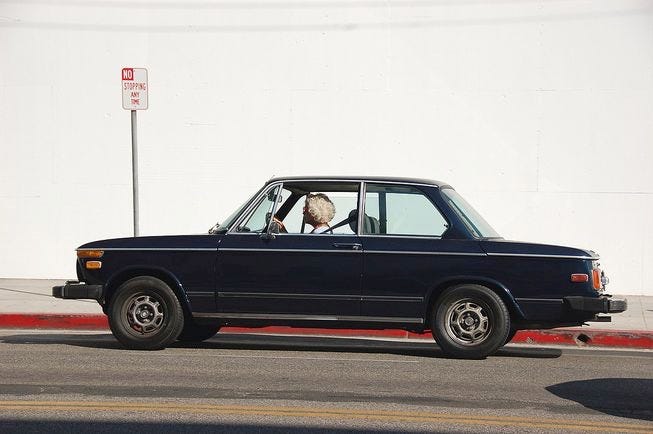
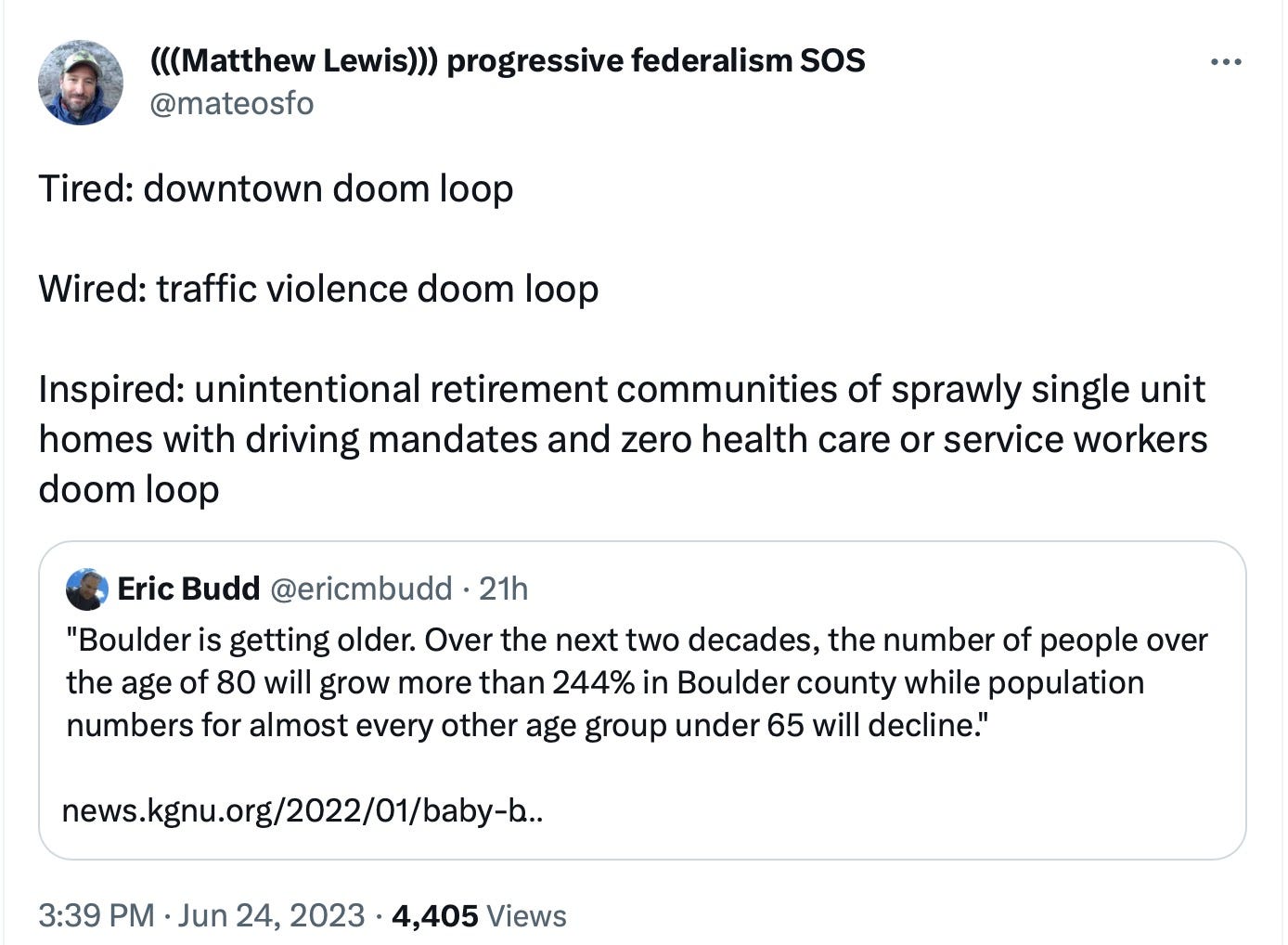
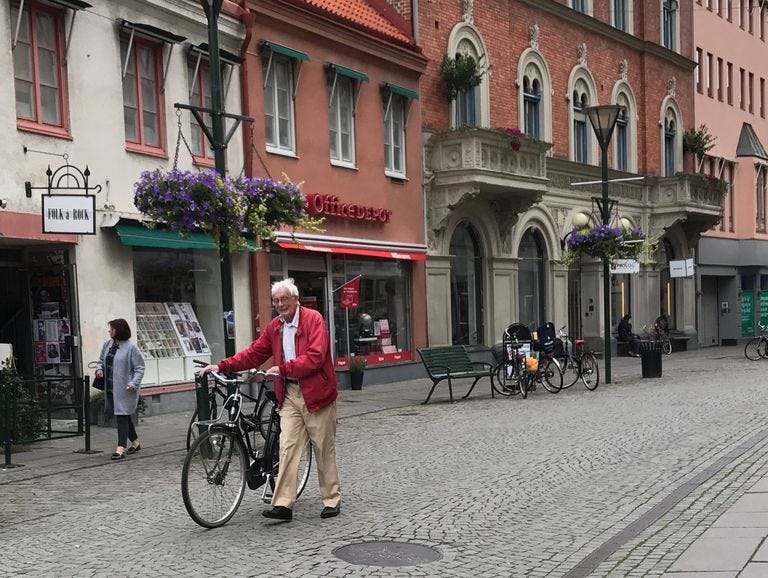
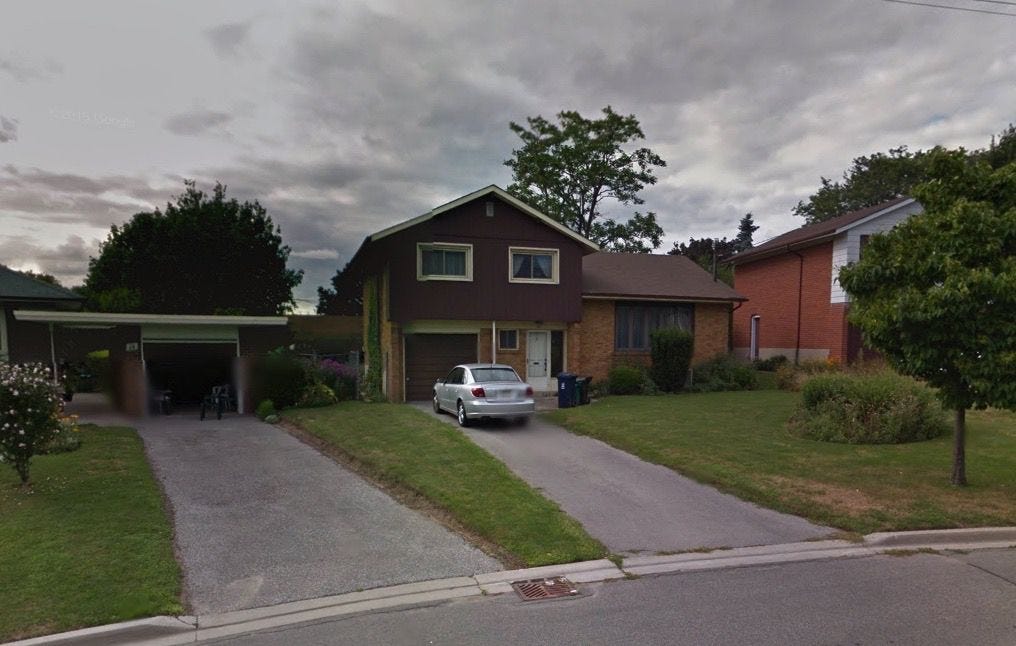
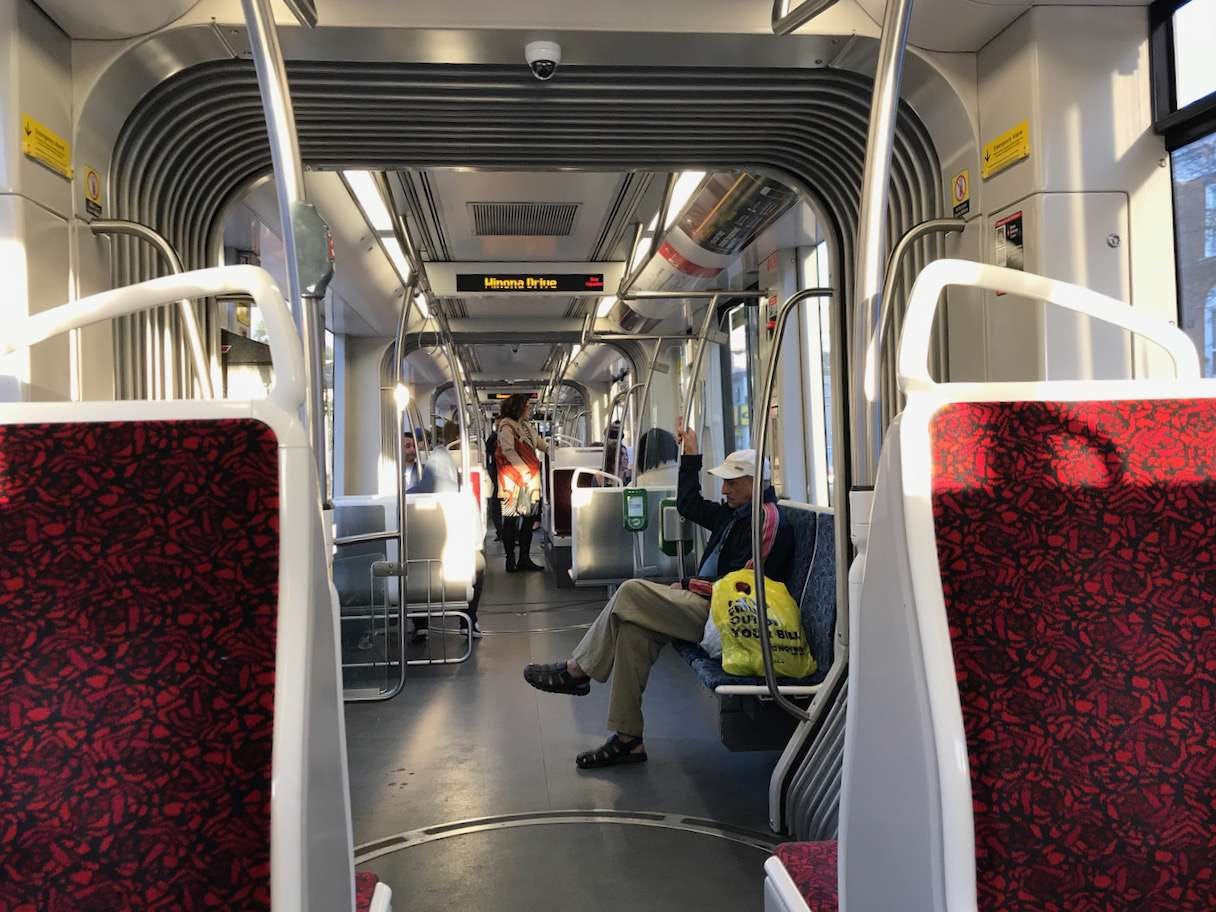
Everyone wants personal mobility. It started with the horse. Individual motorized vehicles are going nowhere.
Two things wrong with this article.
The first, is it smacks of forced urbanization. As I have stated before there are those of us who do not do well among people, who would rather spend time in a garden and growing our own food, walking among trees, and peeing off the front porch. You cannot do that in an urban environment. Well you could in the last instance but, let's be civilized. The point is we like our privacy and would rather be in a small community than a large one where (according to the news), crime is running rampid.
And while people live in rural areas for whatever reason there's likely never going to be a reliable transit system, because the govt. and other entities who run them will never, ever see a profit of sending buses hourly on an extra 20 mile loop that would be mostly if not all the way empty. But say that happens, what about their shopping? Many transit buses do not have a a trunkload of space for groceries or other supplies a homeowner might need. And I know there must be a regulation against carrying flammable liquids on their busses.
Then we have our houses. And here you might have a point. A lot of us are getting too old to keep up our houses, most of us do not live in generational houses, but here we are. We have houses full of memories, and it's hard to put a price on memories. I know the same can be said for apartment dwellers (who can afford those condos with their HOAs) that feel t he same way. But out here in rural country, we look out our kitchen windows and can remember our children playing, we can marvel at the shade tree we planted in the backyard, or even pick a piece of fruit off our own fruit tree. Can you do that in an urban area? As for me personally, I look out and I see acres of trees, my trees, the ones that clean the air we breathe, the same ones that will be cut in a couple of decades to help build houses or maybe even a tree house. The exact same trees that were planted when they were last cut. And while I'm out surveying the land, I have a year round creek which needs investigating (just ask my great grandson). And it also provides water for the wildlife and near-tamed deer which mysteriously disappear during hunting season and return when the season is over...
Then there is the air quality, sure we have to put up with pollen, but, most urban dwellers have not experienced the after rain smell of a forest. Which brings us to the urban areas are noisy and they stink. Stink worse than the skunks I have wondering the property. The urban areas have large rats, larger than the opossums that visit me.
Aside from the Rodentia, there is another kind of rat, the two-legged kind. The ones that escape from the city, comes to the rural areas for a vacation, and not only complains that we're not like the urban area with their amenities but (and this is worse) have no respect for their surroundings as they leave traces (trash) laying where they have been. Sure country folk can and do the same, but, there are more visitors than residents, and after every summer weekend there needs to be a push to clean the areas that the urbanites visit. I guess you can call that job security. The good news about the urbanites is they do stupid things like want to pet the wildlife (and complain when skunks spray them) take a hike in nothing but tennis shoes, a t-shirt and shorts, and get lost because they do not know the area. I call it Darwinism at work, the official wording is search and rescue, the R&S costs the county money, yet, does the rescued urbanite pay, nope it is their right to be rescued and will possibly scream at their rescuers about not getting their sooner...
Well you get the picture.
The second thing that I find wrong, is you say the Saturn is rusting in the driveway. Saturn's do not rust, Their bodies are a form of plastic. And when driven on a regular basis (any car will suffer in parked in the field for years) is as reliable (maybe even moreso with all the recalls I see) than many newer vehicles. I know I have a 1990 Saturn that I drive on a regular basis, and it still gets 35+mpg on road trips (not so big in today's terms but practically unhear of in those days). And I find whatever repairs I need to make on the Saturn is cheaper than many newer used cars. So bad example. But in case you're worrying about the Saturn, I know people who live rurally that would be glad to get it out of your sight when the time comes.